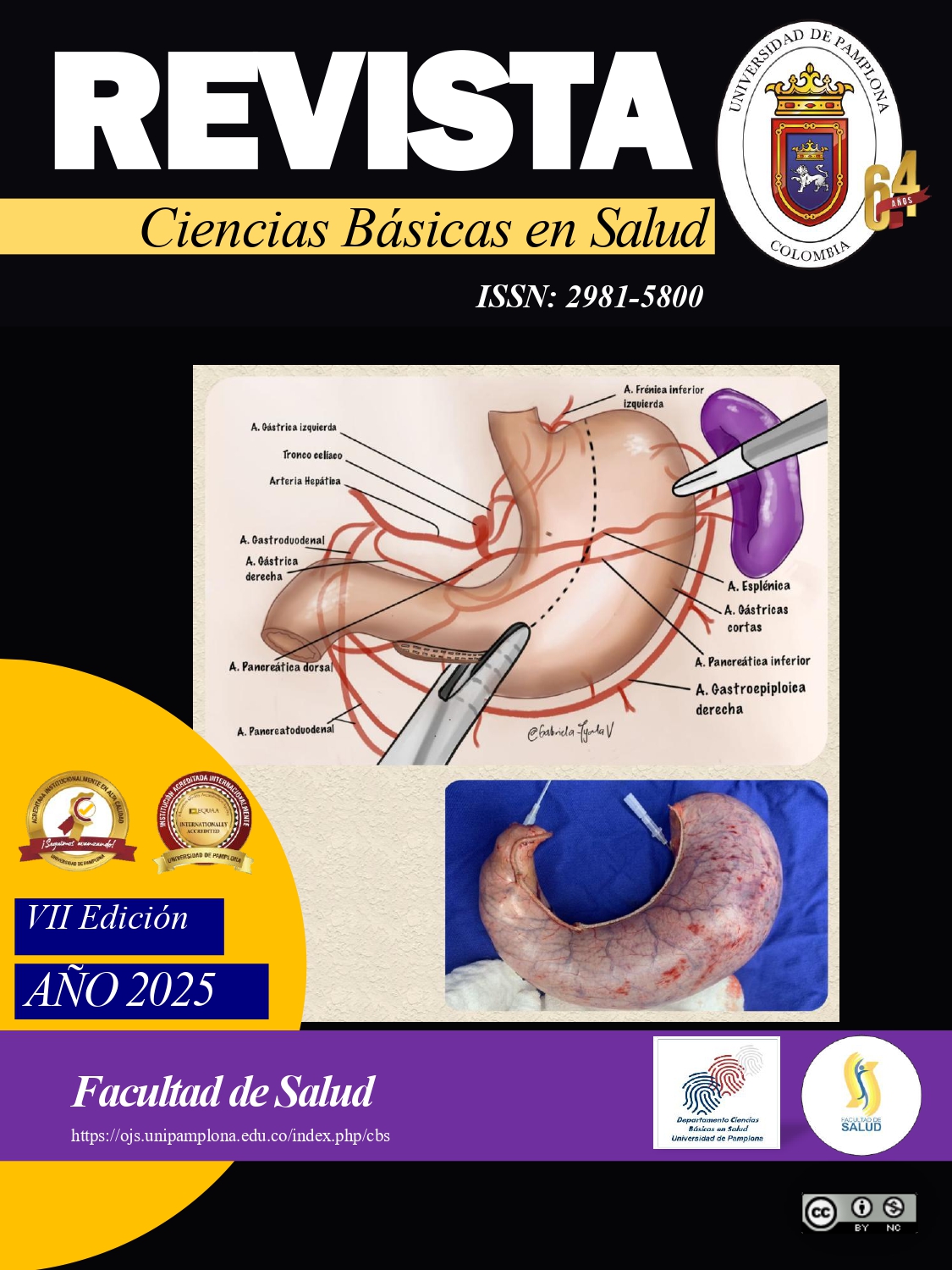Evaluation of the Effectiveness of an Educational Program for the Promotion of Spiritual Growth in Informal Caregivers of People With Disabilities - Pamplona Region
DOI:
https://doi.org/10.24054/cbs.v3i1.3640Keywords:
Spirituality, caregivers, effectiveness, educational activitiesAbstract
Introduction: Spirituality is a vital component of being human. It is established that enhancing the meaning and purpose of life influences people's well-being and quality of life. Objective: To evaluate the effectiveness of an educational program to promote spiritual growth in informal caregivers of people with disabilities in the Pamplona Region. Methodology: Quasi-experimental study that had a descriptive phase in which the HPLP-II instrument was applied to a sample of 308 informal caregivers. Based on the results, the thirty-nine most affected caregivers were identified, twenty being assigned to the control group and nineteen to the intervention group. Subsequently, a protocol of interventions was designed, which were evaluated at the end of the study. Results: In the descriptive phase it was found that 87.7% of the caregivers were in the category “they sometimes carry out practices that promote spiritual growth” and 12.66% do not conduct healthy practices. In the intervention phase it was found that when descriptively analyzing the differences in means with the Student T test, statistically significant results were found in the post-intervention and the experimental group when compared with the control group. Conclusion: When evaluating the educational intervention program, better performance in spiritual practices was found in caregivers after the interventions developed.
Downloads
References
Álvarez-Tello, M., & Morales-Asencio, J. M. (Eds.). (2007). Guía para cuidadoras de personas dependientes (Vol. 1). Asociación Andaluza de Enfermería Comunitaria.
Barbosa, L., & Romero, S. (2008). Caracterización de las cuidadoras y cuidadores permanentes de ciudadanos en situación de discapacidad, usuarios del proyecto comedores-modalidades bono y canasta alimentarios en la localidad de Engativá [Tesis de pregrado, Corporación Universitaria Minuto de Dios]. Colecciones Digitales Uniminuto. https://repository.uniminuto.edu/items/1d23c336-b508-410a-8469-8a8c02744fc5
Britt, K., Richards, K., Radhakrishnan, K., Vanags-Louredo, A., Park, E., & Gooneratne, N., et al. (2023). Religion, spirituality, and coping during the pandemic: Perspectives of dementia caregivers. Clinical Nursing Research, 32(1), 94–104. https://doi.org/10.1177/10547738221115239
Bueno-Castellanos, M., De Souza-Martins, M., & Posada-Bernal, S. (2020). Espiritualidad y estilos de vida. Cuestiones Teológicas, 47(108), 102–118. https://doi.org/10.18566/cueteo.v47n108.a06
Cornejo-Valle, M., Martín-Andino, B., Esteso-Rubio, C., & Blázquez-Rodríguez, M. (2019). El giro saludable: sacrificio, sanación, bienestar y su relación con la espiritualidad contemporánea. Athenea Digital, 19(2), 2125. https://doi.org/10.5565/rev/athenea.2125
Del Ángel, J. E., León, R. C., Méndez, G., Penarrieta, I., & Flores, F. (2020). Relación entre sobrecarga y competencias del cuidar en cuidadores informales de personas con enfermedades crónicas. MedUNAB, 23(2), 233–241. https://doi.org/10.29375/01237047.3878
Díaz, R., & Arias, D. (2021). Efectividad de intervención de enfermería en hábitos de vida saludable desde el modelo de Nola Pender. Revista Española de Nutrición Comunitaria, 28(2).
Donjuan, B. E., Duran, T., Guerra, J. A., & Ruiz, J. M. (2023). Estrés, sobrecarga y espiritualidad relacionados con la calidad de vida de cuidadores de adultos mayores. Salud, Ciencia y Tecnología, 4, 646. https://doi.org/10.56294/saludcyt2024646
García, H., & Acosta, P. (2016). Factores que influyen en los estilos de vida de los estudiantes de enfermería de la Universidad ECCI [Tesis de pregrado, Universidad ECCI]. Repositorio Institucional Universidad ECCI. https://repositorio.ecci.edu.co/handle/001/1814
Lorenzo, D. (2018). La espiritualidad en la humanización de la asistencia sanitaria. Revista Iberoamericana de Bioética, (8), 1–11. https://doi.org/10.14422/rib.i08.y2018.007
Muriel, F. A. Z., Campo, J. C. C., & Acevedo, J. C. T. (2019). Caracterización de la espiritualidad del estudiante de la Corporación Universitaria Lasallista 2017-2018. Revista Lasallista de Investigación, 16(2), 77–89. https://doi.org/10.22507/rli.v16n2a19
Parra, M., Cid, P., & Laudien, M. (2023). Spiritual growth, sense of coherence and self-efficacy of family caregivers of people with disabilities. Revista Gaúcha de Enfermagem, 44, e20220269. https://doi.org/10.1590/1983-1447.2023.20220269.en
Raile, M. (2015). Modelos y teorías en enfermería. Elsevier.
Robinson, S., Zhang, X., & Patel, A. (2021). Coping and adaptation to dementia family caregiving: A pilot study. Geriatric Nursing, 42(1), 256–261. https://doi.org/10.1016/j.gerinurse.2020.08.008
Ross, A., Lee, L., Wehrlen, L., Cox, R., Yang, L., Perez, A., et al. (2020). Factors that influence health-promoting behaviors in cancer caregivers. Oncology Nursing Forum, 47(6), 692–702. https://doi.org/10.1188/20.ONF.692-702
Ross, A., Yang, L., Klagholz, S. D., Wehrlen, L., & Bevans, M. F. (2016). The relationship of health behaviors with sleep and fatigue in transplant caregivers. Psycho-Oncology, 25(5), 506–512. https://doi.org/10.1002/pon.3860
Sakraida, T. (2007). Nola J. Pender: Modelo de Promoción de la Salud. En A. Marriner-Tomey & M. Raile-Alligood (Eds.), Modelos y teorías en enfermería (6a ed.). Elsevier.
Tirro-Arias, V. (2023). Spirituality and quality of life in caregivers of people with dementia. AULA Revista de Humanidades y Ciencias Sociales, 69(2), 39–45. https://doi.org/10.33413/aulahcs.2023.69i2.246
Downloads
Published
How to Cite
Issue
Section
License
Copyright (c) 2025 Basic Health sciencies journal

This work is licensed under a Creative Commons Attribution-NonCommercial 4.0 International License.







